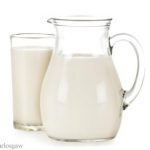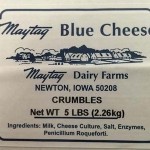The FDA released test results of commodity sampling last week. The products sampled were raw milk cheese aged 60 days, cucumbers, and hot peppers. This sampling program is part of an effort to help ensure food safety. This program was adopted in 2014 to learn more about the prevalence of disease-causing bacteria in foods and to help the agency identify patterns to help prevent future contamination. Raw milk cheese aged 60 days was one of the commodities selected for the first year of testing. Evidence indicates that aging this product for 60 days may not eliminate or adequately reduce disease causing bacteria, posing a hazard. People may still get sick with E. coli, Salmonella, or Listeria monocytogenes infections if they eat these cheeses. And they can suffer serious complications, … [Read more...]
Burton Hill Farm Raw Goat Milk Recalled for E. coli
Burton Hill Farm & Dairy has issued a recall for raw goat milk because it may be contaminated with E. coli a bacteria that can cause serious illness and death. Consumers who have purchased this product should not consume it. The recalled product, labelled "Grade A Raw Goat Milk" has sell by dates of 6/29/2016 and 7/1/2016. It was sold at the Vashon Farmers Market, Phinney Farmers Market, Vashon Island Coffee Roastery, and the Burton Hill Farm in Vashon. Consumers who have purchased the recalled milk can return it to the place of purchase for a refund. … [Read more...]
Cheese Seized from CA Home in Salmonella Outbreak Investigation
Bakersfield Now is reporting that more than 30 packages of Mexican cheese were seized from a woman's home this week, as part of the ongoing investigation into the Salmonella outbreak. Family members of the woman bring cheese from Sinaloa, Mexico. The cheese is being tested for pathogens, according to the report. Seven people in Kern County, which includes Bakersfield, have been sickened with Salmonella infections from eating illegal Mexican cheese. The Salmonella outbreak, which was last mentioned by the California Department of Public Health (CDPH) in March 2016, has sickened at least fifty people across the state with three different strains of the pathogenic bacteria. Officials believe that the common food is home made, soft cheese products. The Director of CDPH and State Public … [Read more...]
FDA Examining Raw Milk Cheese Criteria
Cheesemakers, especially artisan producers, have suggested that the FDA is applying safety criteria to raw milk cheese production that limits producers without benefitting public health. Raw milk cheeses have been linked to recalls and food poisoning outbreaks in the past several years. Raw milk cheese produced by Family Cow in Pennsylvania caused Campylobacter illnesses in 2013, and there have been dozens of recalls of raw milk cheeses over the years. Raw milk cheese has been recalled for Campylobacter, Salmonella, E. coli, and Listeria monocytogenes contamination in all of the four years Food Poisoning Bulletin has been published. Some studies have concluded that aged raw milk cheeses are safe to eat, since the aging process changes the composition of the cheese. Aging reduces the … [Read more...]
Raw Milk Aged Cheeses Are Relatively Safe, According to Study
According to a study published in Food Microbiology, raw milk aged cheeses are relatively safe. The cheeses must be aged at least 60 days, at temperatures not less than 35 degrees F. The aging process produces low pH, low water activity, and high salt content that renders the cheese inhospitable to bacteria, yeast, and molds. The regulations regarding raw milk aged cheeses were enacted in 1950, "long before contemporary pathogens such as Listeria monocytogenes, E. coli 0157:H7, and Campylobacter had been recognized," according to the study. Those bacteria can tolerate inhospitable environments such as low pH and low water activity. In the last 20 years, "many small and several large foodborne outbreaks linked to consumption of cheese made from unpasteurized milk have occurred, both … [Read more...]











